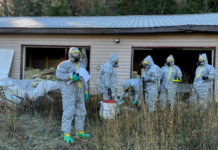Six months after British Columbia decriminalized simple possession of all drugs, statistics show that drug overdoses are projected to hit an all time high by the end of the year.
Despite this data release, Toronto is still moving towards decriminalizing possession of all drugs as well, according to the Toronto Sun.
The City of Toronto has requested an exemption from federal drug laws, pushed by chief medical officer Dr. Eileen de Villa and police chief Myron Demkiw, supported by city council. Toront’s request encompasses an even wider range of drugs than what has been decriminalized in B.C.
Those who are in support of decriminalization claim that the request for exemption is based on “science” and “evidence,” however the recent data published by the provincial government go against those claims.
Decriminalization in B.C. was first brought in on Jan. 31. If the rate of overdose deaths in the province continues at the pace it’s currently at, this year will have the highest number of overdose deaths on record, according to the British Columbia Coroners Service.
B.C. had 1,455 overdose deaths in the first six months of 2023, compared to 1,362 over the same time period last year. The province is facing an overdose death rate of 46.2 per 100,000, which would make it the highest in recorded history.
The number of overdose deaths continues to climb, despite the fact that B.C. has implemented every proposed harm-reduction program, including safe-injection sites, safe supply and decriminalizing all simple possession.
With the exception of a slight drop in overdose deaths in 2019, the number has gone up following the introduction of each new measure.
The number of B.C. overdose deaths for the entire year of 2013 was 334, whereas this year there have already been 1,455. Between January 1 and July 31 the city of Vancouver alone has seen 382 overdose deaths.
Safe supply is a program that aims to curb the amount of emergency room visits and overdose deaths by providing addicts with prescriptions of pharmaceutical grade opioids in an attempt to steer them away from toxically laced street drugs.
In 2016, London, Ont. attempted a pilot project of this program and data found that emergency room visits went up dramatically. In 2021, emergency room visits increased from 39.5 per 100,000 to 203.7 per 100,000 and London’s opioid deaths rose from 6.3 per 100,000 to 25.4 per 100,000.
The pilot project was still considered to be a success and has since been expanded to a number of other communities throughout the country.
Dr. Mark Mallet works in a hospital in Victoria which offers an unwitnessed safe supply program, wherein people are given drugs that they can take home. On Saturday, Mallet wrote an opinion piece for the Globe and Mail, calling for an end to this program. He said he has seen an increase in younger people needing help for opioid addiction since the program has been introduced.
“Unwitnessed safe supply is causing immeasurable harm in unintended and deeply distressing ways,” wrote Mallet.
Despite clear data from both Public Health Ontario and the British Columbia Coroners Service that these programs result in higher death rates and increased visits to the emergency room, many activist doctors still push for these programs.
Dr. Andrea Sereda and several other doctors published a study on the pilot project in London, that they were also participants in and claimed the project to be a success. They took the experience of 100 people who used the program over a four year period and claimed that they had less overdoses and visits to the emergency room.
However, the study does not account for the broader impact these programs have on the community and there is a clear conflict of interest when those participating in the program are also the ones claiming its success.





















